VALUTAZIONE IMDb
6,7/10
8650
LA TUA VALUTAZIONE
Un film giudiziario incentrato sull'omicidio del direttore di una fabbrica.Un film giudiziario incentrato sull'omicidio del direttore di una fabbrica.Un film giudiziario incentrato sull'omicidio del direttore di una fabbrica.
- Premi
- 6 vittorie e 17 candidature totali
Recensioni in evidenza
The defense attorney Shigemori (Masaharu Fukuyama) is summoned to help his coworkers in a murder case. The prisoner Misumi (Kôji Yakusho) has confessed the murder of his former boss and factory owner that was burnt to ashes nearby a river to rob his wallet to pay debts in gambling. Misumi will face death penalty since thirty years ago he killed another man and was defended by Shigemori´s father. Shigemori´s purpose is to change the sentence from death penalty to life. Shigemori is not satisfied with the lack of evidences of the case and notes that Misumi changes his testimony in each interview. He decides to investigate deeper the case and questions the true motive for the murder.
"Sandome no satsujin", a.k.a. "The Third Murder", is a tribunal and fatherhood drama with a screenplay with many twists. The storyline is based on a murder case with a confessing defendant and his new attorney seeking evidences to learn the truth. In common, there is the fatherhood: Shigemori is an absent father due to his dedication to his profession. Misumi is also an absent father since he has spent his last thirty years imprisoned. The victim was an abusive father and Misumi connects to his daughter as a second chance in life. In the end, was the murder to pay a debt with the Yakuza or a righteous justice act? My vote is seven.
Title (Brazil): "O Terceiro Assassinato" ("The Third Murder")
"Sandome no satsujin", a.k.a. "The Third Murder", is a tribunal and fatherhood drama with a screenplay with many twists. The storyline is based on a murder case with a confessing defendant and his new attorney seeking evidences to learn the truth. In common, there is the fatherhood: Shigemori is an absent father due to his dedication to his profession. Misumi is also an absent father since he has spent his last thirty years imprisoned. The victim was an abusive father and Misumi connects to his daughter as a second chance in life. In the end, was the murder to pay a debt with the Yakuza or a righteous justice act? My vote is seven.
Title (Brazil): "O Terceiro Assassinato" ("The Third Murder")
The Third Murder is a gloomy courtroom drama that deals with complex topics like control, fatherhood and righteousness. The story revolves around young lawyer Shigemori who is asked to defend mysterious Misumi. His father once defended the strange man when he committed murder in the past and he managed to change his impending death penalty into a life imprisonment sentence. Soon after his release from prison, Misumi admits to have killed his former boss in order to steal his wallet and settle some gambling debts. However, Misumi soon starts offering different versions of what actually happened. Shigemori is unable to figure his client out but determined to win the case. He starts investigating the complex case himself and stumbles upon the victim's quiet wife and their handicapped daughter who seem to have something to hide. While trying to win the case, Shigemori doesn't only learn more about the lives of everyone involved but about his own family life.
The Third Murder is a movie that is quite tough to watch. Its pace is particularly slow. The investigation process is contradictory, difficult and inconclusive. The film doesn't offer any shifts in action or tension. The conclusion won't please those who are expecting a dynamic crime flick.
However, this film has an almost hypnotically gloomy atmosphere that gives it its very own style from start to finish. The characters are quite intriguing because they are difficult to figure out. Protagonist Shigemori almost pales in comparison to his fascinating client Misumi who meanders between being a manipulative madman, a calm sage in harmony with himself and a mentally broken elder. The dialogues are particularly well-written. The acting performances are quite credible and almost make the movie seem to be a documentary. The locations suit the sinister atmosphere very well as they manage to look beautiful despite their bleak darkness. The calm and precise cinematography completes the picture of this soulful drama.
In the end, you will appreciate The Third Murder if you are ready to watch a slow-paced courtroom drama with an inconclusive plot but intriguing characters and gripping atmosphere. This movie most certainly isn't for everyone but it's good at what it's attempting to be. Patient viewers will be rewarded with some intellectual food for thought.
The Third Murder is a movie that is quite tough to watch. Its pace is particularly slow. The investigation process is contradictory, difficult and inconclusive. The film doesn't offer any shifts in action or tension. The conclusion won't please those who are expecting a dynamic crime flick.
However, this film has an almost hypnotically gloomy atmosphere that gives it its very own style from start to finish. The characters are quite intriguing because they are difficult to figure out. Protagonist Shigemori almost pales in comparison to his fascinating client Misumi who meanders between being a manipulative madman, a calm sage in harmony with himself and a mentally broken elder. The dialogues are particularly well-written. The acting performances are quite credible and almost make the movie seem to be a documentary. The locations suit the sinister atmosphere very well as they manage to look beautiful despite their bleak darkness. The calm and precise cinematography completes the picture of this soulful drama.
In the end, you will appreciate The Third Murder if you are ready to watch a slow-paced courtroom drama with an inconclusive plot but intriguing characters and gripping atmosphere. This movie most certainly isn't for everyone but it's good at what it's attempting to be. Patient viewers will be rewarded with some intellectual food for thought.
It's interesting that Koreeda approaches an apparent thriller in the same way he approaches his family dramas. In fact, this is a drama and, as usual for him, a film about people and grey areas. Here, he addresses the difference between legal justice and what may be ethically acceptable even if a crime.
It's not an easy film, with a quite slow pace and few events that capture our interest. Despite loving thrillers and loving Koreeda's usual style, this film left me wanting much more. Nevertheless, the approach is interesting, the performances are very good, it's beautifully shot (with incredible mirror shots), and the ethical issues it raises stay with us.
It's not an easy film, with a quite slow pace and few events that capture our interest. Despite loving thrillers and loving Koreeda's usual style, this film left me wanting much more. Nevertheless, the approach is interesting, the performances are very good, it's beautifully shot (with incredible mirror shots), and the ethical issues it raises stay with us.
One of the most psychologically and thematically complex autopsies of truth, ethics, and morality I've seen. It reminds me of Rashomon in some respects, except that much of the fluidity and subjectivity of truth in this movie is found within a single character, and within societal systems of "truth-seeking," i.e., the "justice" and legal systems. Even the camera movement in this film is perfectly attuned to those themes, subtly moving into, over, and out of scenes from all directions. Koji Yakusho is superb as usual, and all other acting and casting is excellent as well, as is the score and the editing. I will be thinking on this one for a while.
In recent years, Hirokazu Koreeda has been among the most exciting and interesting Japanese filmmakers. In movies such as "Like Father, Like Son", "Our Little Sister" and "Shoplifters", he tells marvelous stories about seemingly ordinary and non-cimematic sitations....stories about real people and about problems which you rarely hear about in Japanese movies. Here, in a bit of a change of pace, Koreeda takes on a story about murder....and it's complex, strange and ultimately worth seeing. Sadly, however, the pacing is glacially slow...and many viewers ultimately might give up on the film before its conclusion.
The story is about a group of lawyers who have been a pretty hopeless case to defend. It seems a man has pled guilty to murder and burning a corpse...and he's done little to help himself avoid the death penalty. In addition, his story is very inconsistent and keeps changing. Inexplicably, instead of just going through the motions as most lawyers would do in a case like this, Shigemori keeps digging to learn exactly what did happen and why...and, not surprisingly, it's not what the case originally seemed to be.
The story is slow....very, very slow. For non-Japanese audiences, this slowness makes watching the film with subtitles a bit tough...and I found myself drifting off on occasion. My advice is to stick with it....the twist is shocking and exposes some issues rarely addressed in films...especially Japanese films. Not surprising, as Koreeda seems to enjoy addressing topics which other Japanese filmmakers avoid.
The story is about a group of lawyers who have been a pretty hopeless case to defend. It seems a man has pled guilty to murder and burning a corpse...and he's done little to help himself avoid the death penalty. In addition, his story is very inconsistent and keeps changing. Inexplicably, instead of just going through the motions as most lawyers would do in a case like this, Shigemori keeps digging to learn exactly what did happen and why...and, not surprisingly, it's not what the case originally seemed to be.
The story is slow....very, very slow. For non-Japanese audiences, this slowness makes watching the film with subtitles a bit tough...and I found myself drifting off on occasion. My advice is to stick with it....the twist is shocking and exposes some issues rarely addressed in films...especially Japanese films. Not surprising, as Koreeda seems to enjoy addressing topics which other Japanese filmmakers avoid.
Lo sapevi?
- QuizThis is the first fiction film from Hirokazu Koreeda that was shot in anamorphic digital and framed in 2.35:1.
I più visti
Accedi per valutare e creare un elenco di titoli salvati per ottenere consigli personalizzati
- How long is The Third Murder?Powered by Alexa
Dettagli
- Data di uscita
- Paese di origine
- Siti ufficiali
- Lingua
- Celebre anche come
- The Third Murder
- Luoghi delle riprese
- Rumoi Station, Rumoi, Hokkaido, Giappone(the three lawyers arrive in Rumoi)
- Aziende produttrici
- Vedi altri crediti dell’azienda su IMDbPro
Botteghino
- Lordo Stati Uniti e Canada
- 89.315 USD
- Fine settimana di apertura Stati Uniti e Canada
- 10.670 USD
- 22 lug 2018
- Lordo in tutto il mondo
- 13.411.936 USD
- Tempo di esecuzione
- 2h 4min(124 min)
- Colore
- Mix di suoni
- Proporzioni
- 2.35 : 1
Contribuisci a questa pagina
Suggerisci una modifica o aggiungi i contenuti mancanti




























